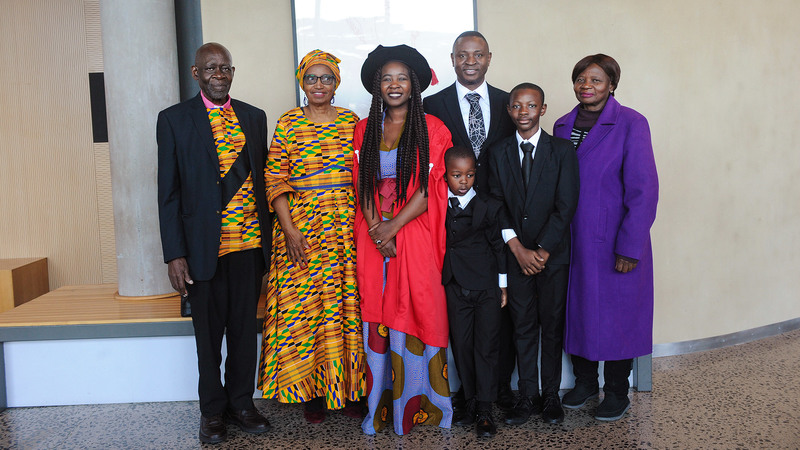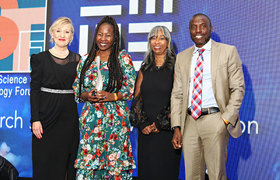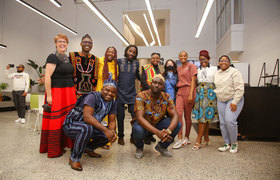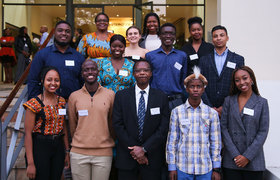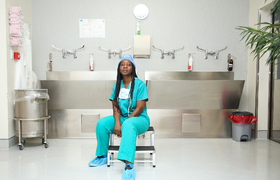Global surgery strategies, systems crucial to ensuring timely, safe surgery – especially for women
20 July 2023 | Story Helen Swingler. Photos Lerato Maduna. Read time 7 min.The first rural hospital patient who died on Professor Salome Maswime’s watch precipitated a crisis most young doctors in community service experience. Was it her? Did she lack skills? In fact, she had done all she could, in a situation that was symptomatic of a larger, national crisis in healthcare systems – one reflected globally, and shaped by politics, economics and geography.
Of a population of almost 1.5 billion people in Africa – representing 16.72% of the world’s population – approximately one billion people lack access to safe and timely surgery, said Maswime, who later specialised in obstetrics and gynaecology at the University of Cape Town (UCT).
Now a professor and the head of Global Surgery at UCT, she was speaking at her inaugural lecture on 12 July. The fifth in the UCT Inaugural Lecture Series, it was titled “From Caesarean-section-related complications to global surgical systems strengthening”.
Maswime is the president of the South African Clinician Scientists and chair of the Health Systems Trust Board. A strong advocate for women’s health rights and equity in surgical and maternal care, Maswime also advises and consults for several institutions, including the World Health Organization.
It was a big week for the multiple award-winner. On 13 July, a day after her inaugural lecture, Maswime won the National Science and Technology Forum (NSTF)-South African Medical Research Council Clinician-Scientist Award. This was announced at the 2022/2023 NSTF-South32 Awards, for excellence in science, engineering, technology and innovation in South Africa.
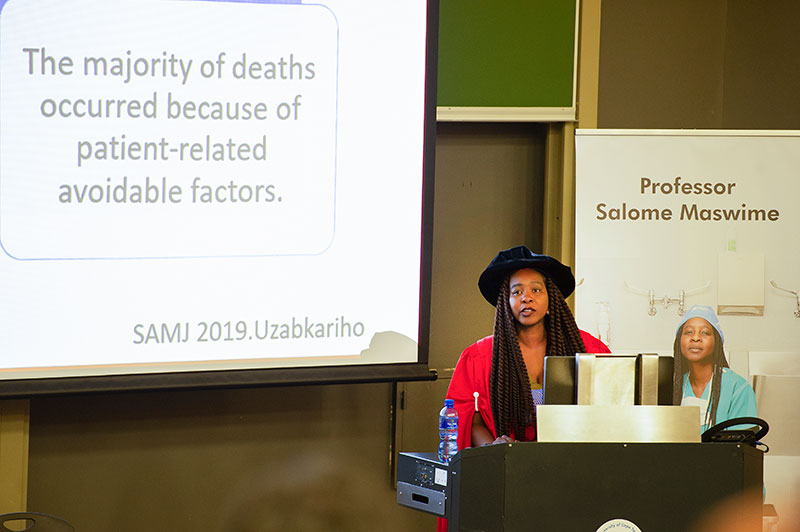
The accolade recognises her roles in pioneering global surgery in Africa, part of a drive for greater equity and access to much-needed surgical care – and measures that will reduce South Africa’s maternal mortality numbers due to caesarean sections.
Sobering statistics
The global statistics also make for sobering reading. According to the Lancet Commission on Global Surgery, five billion people across the world lack access to safe, affordable surgical and anaesthesia care when needed. It is estimated that 143 million additional surgical procedures are needed each year to save lives and prevent disability, she said.
“Worldwide, there’s an unmet need for access to safe, affordable surgery and anaesthesia.”
But the gap between surgical services and systems is widening. Global surgery strategies are needed to increase the number of surgeons and surgeries, improve surgical outcomes, decrease the need for surgery, and increase the cost-effectiveness of surgery.
“Worldwide, there’s an unmet need for access to safe, affordable surgery and anaesthesia when needed,” Maswime added.
But in low-income countries the surgical crisis is dire, particularly for pregnant women.
While caesarean sections are the most widely performed surgery in the world, an African study Maswime and colleagues conducted in 183 hospitals involving 3 792 patients across 22 countries showed that African women are 50 times more likely to die from caesarean section and infection complications than women in high-income countries.
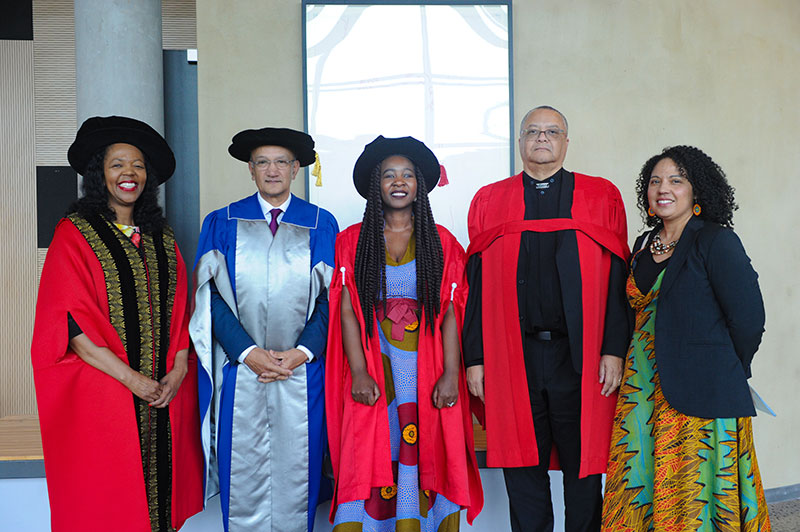
“African women have worse surgical outcomes than women in high-income countries, even when they are healthier and younger at the time of surgery,” she said. “And the outcomes were worse during the COVID-19 pandemic.”
“Women in Africa are dying from preventable complications of surgery.”
The drivers of these poor surgical outcomes are lack of access to care and delayed access to care; a shortage of specialists, equipment and resources; lack of multi-disciplinary care; poor infrastructure, pre-operative and post-operative care; and poor rehabilitation.
“Women in Africa are dying from preventable complications of surgery.”
Citing former United States president Barack Obama, who said that “change requires more than righteous anger; it requires a programme, and it needs organisation”, Maswime said, “That programme is global surgery”.
New, interdisciplinary field
Global surgery is a relatively new, interdisciplinary field of enquiry, research, practice and advocacy. It aims to bridge the gap between surgical services, surgical systems and surgical leadership. The field also proposes novel and innovative methods to strengthen surgical systems, by improving the quality of surgical care and increasing access to surgical care, and by reducing the need for surgery.
“The aim is to improve health outcomes and achieve health equity for all people who need surgical, obstetric and anaesthesia care, with a special emphasis on underserved, marginalised populations and those in crisis,” Maswime explained.
“Global surgery is about looking beyond the theatre to what’s happening outside the theatre: access to care for everyone.”
“But we are dependent on a functional system for us to have good outcomes. So global surgery is about looking beyond the theatre to what’s happening outside the theatre: access to care for everyone.”
One of the strategies for global surgery is to increase the number of surgeons and the number of surgeries, improve surgical outcomes, and decrease the need for surgery by looking at preventable conditions.
“Women survive surgical complications in settings with a functional health system; with access to multidisciplinary specialist teams and services, and efficient referral systems.”
Recommendations
Maswime’s recommendations include developing a pipeline of African global surgery scholars and developing surgical leadership. In Africa, this rests on vital collaboration between faculties, nations and governments, to design and lead evidence-based projects to improve surgical outcomes.
“It’s not about how good you are as a doctor; you are as good as the system you function in.”
Here UCT’s Executive Leadership in Global Surgery programme has been doing solid work, equipping surgeons with the skills they need to become change agents in their fields, she said. Beyond establishing the Global Surgery division, the Faculty of Health Sciences has also published the Global Surgery Action Strategy, 2023–2030 and a Research Strategy 2022–2030 to bolster the initiative.
Referring to her earlier experience as a new doctor in rural South Africa, Maswime said it took some years for her to realise that “it’s not about how good you are as a doctor; you are as good as the system you function in”.
“As Professor Mahmoud Fathalla puts it, ‘Women are not dying because of diseases we can’t treat. They are dying because societies have yet to make the decision that their lives are worth saving.’”
Among her final thoughts were some that dealt with how surgeons need to think about where patients come from, how they access healthcare, and where they return to after surgery.
“We also need to consider the built environment, and a community-centred approach to improving surgical care,” she said. “If communities are educated about their conditions, those interventions could lead to better outcomes.”
Her final quote, from the late Dr Paul Farmer – taken from his book Pathologies of Power: Health, Human Rights, and the New War on the Poor – summed up an issue that is fundamentally a human rights crisis: “If access to healthcare is considered a human right, who is considered human enough to have that right?
 This work is licensed under a Creative Commons Attribution-NoDerivatives 4.0 International License.
This work is licensed under a Creative Commons Attribution-NoDerivatives 4.0 International License.
Please view the republishing articles page for more information.


